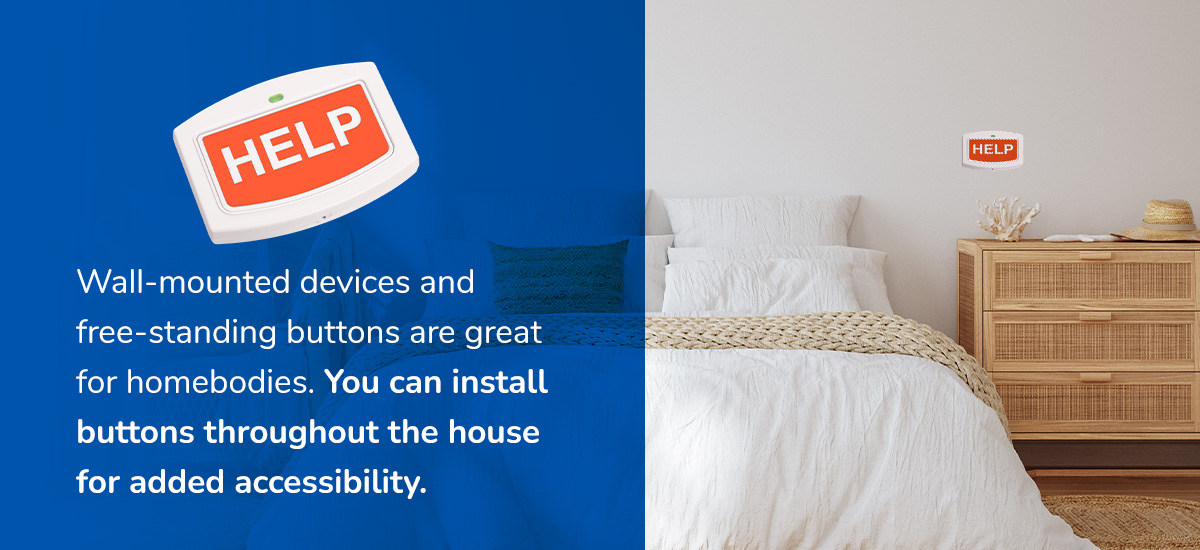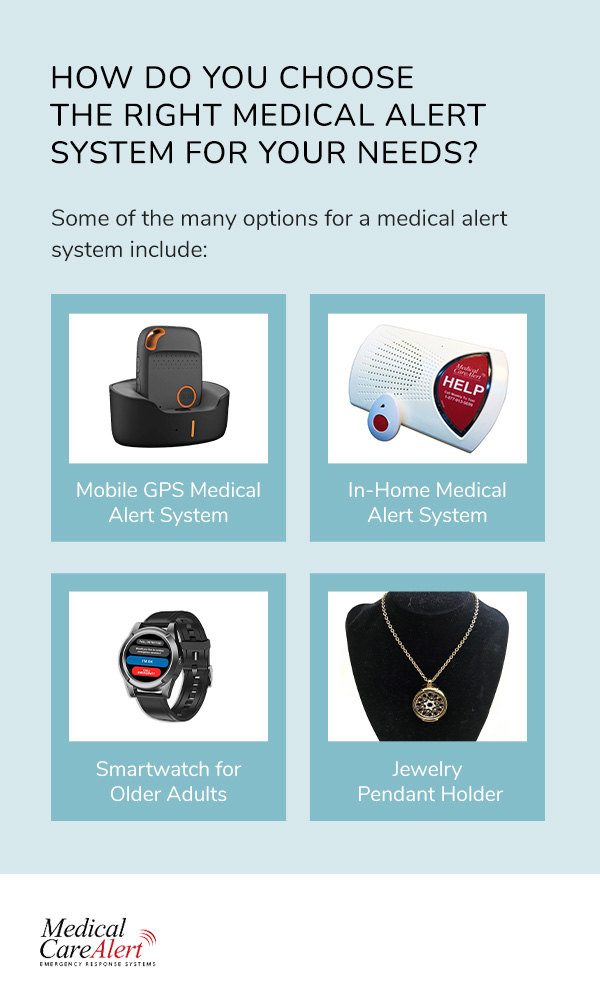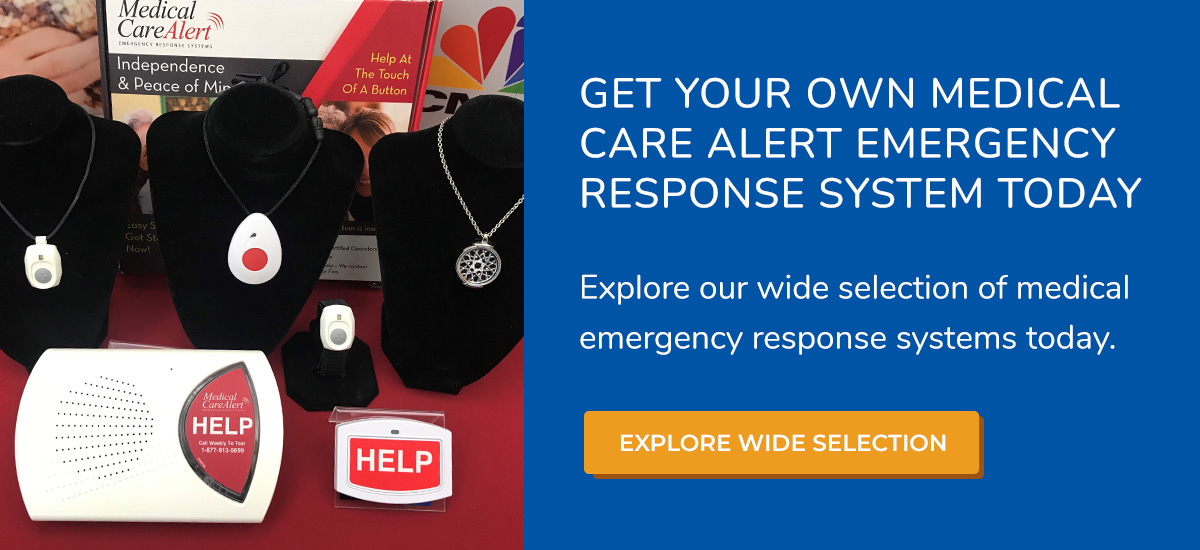How Medical Alert Systems Work: The Essential Guide
Medical Care Alert on Oct 2nd 2024
How Medical Alert Systems Work: The Essential Guide
As you or your loved ones grow older, access to emergency care may become more top of mind. Falls are the most common cause of injury for adults older than 65. In fact, one in every four older adults report a fall yearly in the United States. Luckily, safe independence is possible with a few tools.
What are Medical Alert Systems?
How Do Medical Alert Systems Work?
What Are the Types of Medical Alert Systems?
- Monitored vs. Unmonitored Medical Alert Systems
- Wearable vs. Nonwearable Medical Alert Systems
- Mobile vs. Landline Emergency Response Systems
How Do Medical Alert Systems Function With GPS Tracking?
Do Medical Alert Systems Need Internet?
How Do Medical Alert Systems Work Away From Home?
Why Choose Monitored Medical Alert Devices?
How Do You Choose the Right Medical Alert Systems for Your Needs?
What Are Medical Alert Systems?
Medical alert devices provide peace of mind and safety for older adults, people with high support needs and their caregivers. With the push of a button, it connects the person in need with emergency services and alerts loved ones or caregivers.
Unlike the medical alert systems of the past, people can wear these devices as wristbands or pendants. Mom and Dad also have the option to carry them on their belt clip or mount them on the wall.
How Do Medical Alert Systems Work?
While there is a wide range of medical alert systems, they all contact medical professionals in an emergency. These devices are simple to use, whether as a fixed at-home system or a wearable gadget. There are some differences between medical alert systems, but most follow this process:
1. You press your device's “help” button during a medical emergency. If your device has fall detection and registers an impact, it automatically makes the call.
2. The device connects you with an emergency operator.
3. The operator confirms if you need medical help via a two-way speakerphone on your device.
4. If you need help, the operator dispatches first responders to your location.
5. If you remain silent, operators try calling your phone. If you don't answer, they dispatch emergency services.
6. Upon dispatching help, the operator will notify loved ones or caregivers where you are and what is happening.
What Are the Types of Medical Alert Systems?
The best emergency alert device for you or your loved one will depend on what you want to gain from the device. Some areas you may want to think about when choosing a device are:
- Lifestyle
- Limitations
- Goals
Types of medical alert systems include:
Monitored vs. Unmonitored Medical Alert Systems
You can customize the response process with a monitored or unmonitored alert system. Both options have benefits. However, monitored medical alert devices are a better choice for wearers who leave the house often.
1. Monitored Medical Alert Systems
When you press the “help” button or your device registers a fall, it connects to the medical alert company's emergency response center. The emergency medical dispatchers (EMDs) in the emergency response center have extensive training. They will also have your or your loved one's name and information in their system. The EMDs will:
- Speak with you over the loudspeaker to gauge what level of help you need and where you are.
- Alert emergency services or family as needed. Upon request, the operator can stay on the line until help arrives.
- Notify family members if emergency services are dispatched.
2. Unmonitored Medical Alert Systems
Unmonitored medical alert systems bypass trained in-house operators. They contact a predetermined number, usually a family member or 911. Since they don't have information like your location or how much help you need, they will dispatch a one-size-fits-all response team. Sometimes, alert systems read out a prerecorded message. This is helpful, but only if you're at a predetermined location, like home.
Wearable vs. Nonwearable Medical Alert Systems
Some older adults and people with high support needs are home-bound. Others leave the house to run errands, socialize or visit health care providers. Most people are comfortable wearing a pendant or watch, while some are not. Luckily, there is a device to match everyone's preferences.
1. Wearable Medical Devices
Wearable alert systems offer the most comprehensive, round-the-clock support. They are perfect for more active, independent people or those more likely to fall or faint. Most medical alert wearables are shower-safe and come with motion-triggered fall detectors. This means emergency services will be contacted even if the wearer falls unconscious.
Wearable medical devices can be bracelets, necklaces, multipurpose smartwatches or unisex pendants. Modern wearable devices like the detachable HOME & AWAY MINI GPS Medical Alert System offer the option to wear them as pendants or belt clips. They are the perfect choice for users who want a sleek, compact, portable design with premium safety features.
2. Nonwearable or “In-Home” Medical Devices
Wall-mounted devices and free-standing buttons are great for homebodies. However, they may be out of reach during a fall or when traveling. You can install buttons throughout the house for added accessibility. Other nonwearable devices pair with corresponding wearable devices, providing users with a few options to request help.

Mobile vs. Landline Emergency Response Systems
Connection is the defining feature of a medical alert system. It provides the lifeline you or the older adult you're caring for needs in a crisis. Personal emergency response systems link the user with operators in two primary ways:
1. Cellular-Based Systems
Devices that connect through the cellular network are convenient because you can make an emergency call wherever you are. They are usually wearable or portable devices. Some home-based systems in residences without a landline can also connect to cellular networks. Devices connect on their own, which means you don't need an independent personal cellphone.
2. Landline-Based Systems
Many in-home medical alert systems have a central console. This system connects to emergency dispatchers using the house's landline. It connects to several auxiliary buttons around the home or a wristband button that connects within a 1,000-foot range. This method of communication is best for older adults or individuals with high support needs who usually stay in one location.
How Do Medical Alert Systems Function With GPS Tracking?
Mobile emergency response devices with cellular connection and GPS offer the most peace of mind. They allow operators to pinpoint the user's location with satellite technology. This ability is especially helpful if the user cannot communicate verbally. This feature is a game-changer for falls and medical crises outside the home. Family and caregivers can also download a smartphone app to track the user's location for the ultimate peace of mind.
Do Medical Alert Systems Need Internet?
Generally, medical alert devices don't need internet access to function. Home-based landline and cellular emergency response systems contact operators by making a phone call. This means the system only requires the home's telephone line. Mobile devices with cellular connectivity work similarly. They allow the user continued safety even in the event of an internet outage.
Do Medical Alert Devices Need Wi-Fi?
Most medical alert devices do not have Wi-Fi connectivity. Advanced wearable devices can use public and private Wi-Fi hotspots to help operators find your location. In devices like the HOME & AWAY MINI GPS Medical Alert System, Wi-Fi connectivity is a bonus, not a necessity. GPS and cellphone tower triangulation already note your location information.
How Do Medical Alert Systems Work Away From Home?
Mobile alert systems still work when the user is away from home. They connect to cellphone towers across the U.S.
The user must charge them every couple of days so they are ready to respond. If you've only got a landline alert system, the wristband button will still work up to three football field lengths away from its console. So, if you're visiting a neighbor's apartment or getting the mail, it can still connect.
Why Choose Monitored Medical Alert Devices?
Monitored emergency calls have several benefits that make them the better choice for you and your family:
Customizable Emergency Response Services
Customized emergency response services allow the user to decide their care when an emergency happens. For example, the user can pre-set their emergency contact. You can change these specifications anytime with no additional charges. Monitored medical alert devices also include benefits such as a 100% lifetime replacement warranty on wearable buttons. Users can also take advantage of coded lock boxes so emergency services can easily enter their homes.
Expert Monitoring Center With 24/7, Nationwide Coverage
When you press the button, the staff at the help center you reach are all trained EMDs or emergency medical technicians (EMTs). These specialists have undergone extensive training to give the best support possible. They have information on the user's locations and emergency contacts. They'll send text messages alerting predetermined loved ones or caregivers.
How Do You Choose the Right Medical Alert System for Your Needs?
As with any medical service, the right choice will depend on what you want to achieve from the system. Most users are looking for complete peace of mind, making monitored medical alert systems a great choice. Others want something they can easily wear when they are out and about.

Knowing how medical alert devices work will help you choose an option you or your loved one will feel good about. Some of the many options for a medical alert system include:
1. Mobile GPS Medical Alert System
Monitored mobile personal emergency response systems are the gold standard in medical alert technology. They come with all the features needed for optimal monitoring and peace of mind. People who best suit cellular-based GPS-enabled medical alert systems include those who:
- Frequently leave their homes for errands, leisure activities, physical activity and social events.
- Prefer a sleek, understated-looking device that can be worn in multiple ways.
- Want something water-resistant they can wear in the shower, bath and rain.
- Want 24/7 access to emergency service dispatchers with their information on file.
- Have loved ones or caregivers who want to keep track of their location via GPS and receive notifications.
- Want access to fall detection technology that automatically alerts operators and family.
2. In-Home Medical Alert System
Monitored in-home medical alert systems are the more common choice for emergency assistance. Fortunately, modern technology has given in-home systems much more versatility. This change makes them more appealing to a broader audience. An in-home medical alert system is suitable for you or the older adult you care for if they:
- Stay within a 1,000-foot radius of the home most of the time.
- Need easy installation and user-friendly operations.
- Live in or run a residential facility like a retirement community.
- Want quick and easy access to emergency services 24/7.
- Have low vision or mobility or want large, legible buttons.
- Want to use a landline as their primary connection method.
3. Smartwatch for Older Adults
Many older adults want a smartwatch without the complications of today's commercial smartwatches. Smartwatches designed for older adults, like the SmartWatch PRO, have emergency alert services. Some of the many features of these watches include:
- Two-way communication
- A digital or analog clock face
- A heart rate monitor
- A step counter
This watch is perfect for people who:
- Prefer to wear a watch instead of a pendant or belt clip.
- Like to receive medication reminder notifications on their device.
- Have caregivers who want to track their location via their medical alert device.
- Want fall detection capabilities, 24/7 emergency support and customized care.
4. Jewelry Pendant Holder
Medical alert systems can be beautiful and functional. If you pick an in-home monitoring system from Medical Care Alert, you can get a spectacular silver or antique gold necklace that holds a standard emergency response button. These necklaces are great gifts for older adults who need 24/7 access to emergency help monitoring but do not want to wear a device.
How Can Medical Care Alert Help?
At Medical Care Alert, we understand that peace of mind is irreplaceable and can improve the lives of the wearer and those who care for them. That's why we offer monitored medical alert systems in all shapes and sizes to fit your family's unique needs. Our devices have nationwide, 24/7 coverage. Our dedicated monitoring center offers professional treatment wherever and whenever you need it.
Medical Care Alert offers a range of devices to help you or your loved one safely maintain independence:
- Senior Smartwatches
- HOME Medical Alert Systems
- HOME & AWAY GPS mobile systems
We're family-owned and customer-centric with our own family members on the system. We are always looking out for our clients' best interests by providing the best, most cost-effective support possible.
Other benefits of choosing us for medical alert systems include:
- Award-winning operators: You or your loved one will receive 24/7 monitoring from EMT- and EMD-certified operators who put your safety at the forefront.
- Free text message notifications: Should an emergency occur, our team will call and text your list of contacts associated with your medical alert device.
Check out previous clients' honest reviews to see how many lives our products have changed.
Our Free Lock Box
Medical Care Alert prioritizes your well-being, comfort and happiness at every turn. That's why we've thought ahead and offered a unique and innovative solution to emergency home visits — the lockbox. If you need emergency help but your door is locked, relatives or EMTs can use a secret code to access a copy of your door key from a secure lockbox outside your home. No breaking down doors or repairs will be necessary.
Get Your Own Medical Care Alert Emergency Response System Today
Explore our wide selection of medical emergency response systems today to start enjoying greater peace of mind. Want to learn more about the many benefits our products provide? Review our comprehensive FAQ page or contact us today to discuss your options.
Free Brochure
By Mail
Or call us at
855-272-1010



